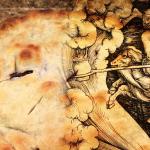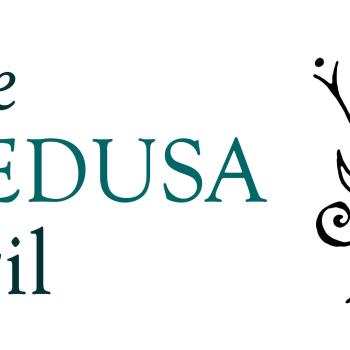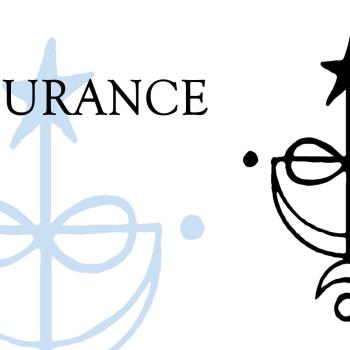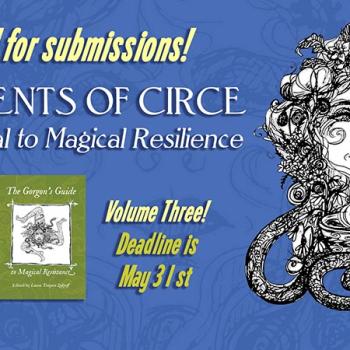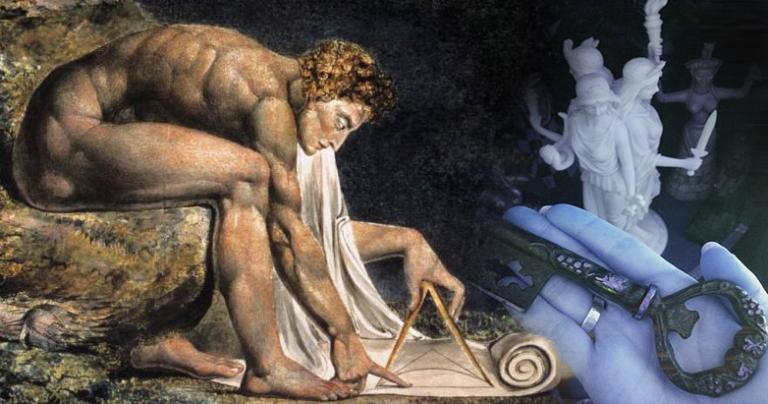
I suppose I could warn the people who attend my workshops that they may find pieces of themselves in future blog posts.
But I don’t think that it’s a bad thing at all. Rather, if someone makes an interesting point or asks a question that stimulates more discussion, they are probably not the only person wondering or thinking that. What I especially love about teaching (besides satisfying the Gemini urge to TELL YOU ALL THE THINGS) is that I always learn something in the process. Seeing the material through different eyes and working to find solutions is a challenge I love.
This past weekend I taught “The Witch’s Cauldron” and “The Authentic Witch: Crafting A Working Tradition” at Puget Sound Pagan Pride Day and then “We Are Aradia” down in Portland at The Sacred Well on Monday. All of them had great discussions, but “The Authentic Witch” class brought up some especially interesting questions and scenarios that have been wandering around in my head. Yes that means while I answer questions in the workshops, that doesn’t mean I consider them done. Rather, I keep thinking about them well after the fact.
So here’s one of those questions (paraphrased): “Do I even need to find a teacher in the Craft?”
Before we get to the answer part, some background:
Part of what I love about this question is that it came from a mature adult, who was taking lots of notes. Why does that matter? This particular workshop always draws a wide mix of people: young people just starting out, older folks who may be coming late to this path, or perhaps they’ve done years of other systems and they still haven’t exactly found what they’re looking for. (Plus usually a few people who read the title/description, take a look at a photo of me, and decide they want to be entertained. I am apparently highly entertaining, as folks keep telling me – but we’re talking more of the “well, actually” crowd…) Anyway, my read on the person was that they had been working on trying to figure out the answer for a while.
There’s a couple ways of looking at this question. One way is to ask, are you looking to follow a specific tradition? Then yes, it would behoove you to find a teacher of that tradition to study with. The same is true for skills and technical crafts as well. For example, want to be an herbalist? Then you need to study with an herbalist (or ideally, plural, over time). Reading it from a book isn’t going to give you the hands-on experience necessary. And you’ll want to be constantly updating your skills and knowledge over the years as well. (As John Beckett points out here in his post.)
Another way to answer it is a bit more elusive and less obvious. It involves abandoning the formal academic idea of the teacher-student relationship – and take on a Witch’s perspective. That viewpoint is: the whole world is our teacher, if we’re paying close enough attention. Some times we enter into formal agreements, and the rest of the time we’re sloshing up against everything like jellyfish. The best kind of learning isn’t a one-way dictation or write and repeat, but rather an immersive experience.
I have a hard time seeing Witchcraft as something you learn in a set time-frame: a year and a day, 3 years and 3 days, via a certification course, etc. I believe the same is true for dance and art as well. You can complete a course, but does that mean you really know what you’re doing? The course offers guidance and maybe a paper reward, but that doesn’t put someone above or below a person who chooses a different approach. Dance, painting, witchery – these things all require living experience in order to understand them – to truly be skilled and artful at them. The classroom format can definitely lend a sense of order and validation, but it’s just one way to learn.
Surrounding this topic, I am reminded of some advice I received nearly 20 years ago from very different sources:
1) “Sure, you can go to grad school, but the world is a greater classroom.” I received this information from two teachers I had in college – who are both still present in my life today, long past that initial student-teacher relationship. One taught art and design, the other taught history and language with esoteric framing. I had yet to regret not going to grad school, and I can see the fortune of the life experience that has informed my art and practice. If I wish to learn another form of art, a technique of some sort – I can go and study that technique specifically, but there are a variety of options I can choose: apprenticeship, adult education classes, special programs, etc. 
2)”You can learn something from every dancer. Sometimes it’s what to do, and sometimes it’s what NOT to do.” I was given this unsolicited advice in parking lot outside a restaurant. I had just seen a couple of dancers perform live for the very first time, and was asked my opinion of them. Since I had only been taking dance classes for a short time at that point, I had been mesmerized by the beauty of both dancers – how they moved, the shiny, glitzy goodness of their costumes, the way they commanded the room. I was in love! I couldn’t wait to be like them! The advice came from a more established dancer, who was not my peer nor my teacher – and not one known for tact either, I would discover. Their words were jarring to my reverie of the moment, but in time I would understand what they meant. The advice also applies to more than just dance – every person we encounter can be someone we can learn from: whether observing what works, or what doesn’t work – and choosing what is best for our own path.
In retrospect, there was more to that moment than those words as well. There is nothing wrong with falling in love with something. No, we’re not going to see the warts and all right away, but it draws our attention and gives us new focus. Nor is it our job to harsh anyone else’s high, just because we’ve already seen it. We all figure it out at our own pace, and sometimes we learn the hard way too. Sometimes that means finding out that the owls are not what they seem. We all have different needs, different ways of learning.
And the universe has many ways of teaching us. There is the way the ocean teaches us in the flow and pull of its waves, about the dangers of overestimating its power and our own footing, how the water easily gives and takes. There’s the lessons of the trees – the cycles of blossoming, covering, and shedding, the patience of slow growth, and the inter-connectivity of its roots and branches with other beings around it. The way that fire gives light and warmth, but is also all-consuming – and how it dies without breath. There is also the whispering of the spirits and ancestors in our dreams and in our bones. Then there are the people in our lives – those we are born into, those we choose, and those we flow with and against – they are all lessons.
So if you feel comfortable with an academic approach – there’s nothing wrong with that. Just realize it’s just one approach, and to get more in depth, you’re going to need to get out “in the field” beyond that. Truly, you will never stop learning – as long as you’re open to see that we can see everything as an opportunity to learn, grow, and challenge ourselves.
So do you need a teacher in the Craft? Yes you do. Many in fact. But you don’t necessarily need to study with a certified Witch to become one. Open your eyes – the teachers are all around you.


